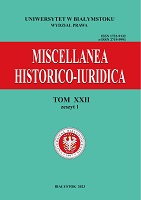Military and Civilian Requisitions in Light of the Rulings of the Supreme Administrative Tribunal from 1923 to 1931
Military and Civilian Requisitions in Light of the Rulings of the Supreme Administrative Tribunal from 1923 to 1931
Author(s): Marcin KonarskiSubject(s): History of Law, Civil Law, Social history, Interwar Period (1920 - 1939), Sociology of Law, Administrative Law
Published by: Wydawnictwo Uniwersytetu w Białymstoku
Keywords: Second Polish Republic; administrative justice; military requisitions; civilian requisitions;
Summary/Abstract: The institution of military and civilian requisitions is inextricably linked with the obligation to comply with public burdens and contributions, and it may be applied both in wartime and in peacetime. In-kind contributions in the form of requisitions by competent State authorities of items necessary to serve an unspecified public purpose, usually to meet the needs of the army, have from time immemorial been among the most onerous burdens to benefit the State. Requisitions – the subject of this analysis – constitute a means of searching for items that are of interest to the army and are a direct form of duty imposed on individuals to make them contribute to the public administration, thus constituting a breach of the principle of the inviolability of private property rights. The main focus of this discussion, however, is not an analysis of the substantive legal aspects concerning requisitions, but an analysis of the body of administrative rulings on these matters. Military requisitions constituted the basis of the system of wartime contributions that gave the State, through authorised bodies, the right to demand these contributions from the population, in particular the right to transfer to the State, in return for payment, ownership or the right to use movable and immovable property, directly or indirectly needed for the purposes of supplying the army and the state upon the outbreak of war or the ordering of a partial or general mobilisation. Some cases that found their way to the Supreme Administrative Tribunal in the first years of its existence resulted from complaints against the activities of military requisitioning bodies, mainly during the Polish- -Bolshevik War. Civilian requisitions, on the other hand, became the subject of the rulings of the Supreme Administrative Tribunal as a result of complaints over the obligation to provide housing for servicemen and civilian officials in the first years of a reborn Poland, the direct cause of which should be attributed to the dramatic shortage of housing during the first years after the end of the First World War.
Journal: Miscellanea Historico-Iuridica
- Issue Year: 22/2023
- Issue No: 1
- Page Range: 201-222
- Page Count: 22
- Language: English

